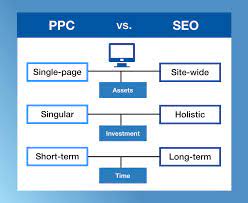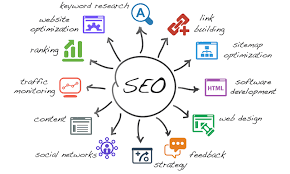Unlock Global Success with Expert International SEO Services
International SEO Services: Expanding Your Reach Globally
In today’s digital age, having a strong online presence is crucial for businesses looking to expand beyond their local markets. International SEO services play a vital role in helping companies reach a global audience and drive traffic to their websites from around the world.
What are International SEO Services?
International SEO services involve optimising a website to rank well in search engine results pages (SERPs) across multiple countries and languages. This requires a strategic approach that takes into account the nuances of different regions, languages, and cultures.
The Importance of International SEO
Expanding your business internationally offers immense growth opportunities, but it also comes with challenges, especially in the online space. International SEO helps overcome these challenges by:
- Increasing Visibility: By targeting international keywords and optimising your website for different regions, you can improve your visibility in global search results.
- Driving Traffic: With effective international SEO strategies, you can attract quality traffic from diverse geographical locations.
- Boosting Conversions: Tailoring your content and website to local preferences can lead to higher conversion rates among international visitors.
- Building Trust: Localised content and targeted SEO efforts help build trust with international audiences, enhancing your brand’s reputation globally.
The Components of International SEO
Effective international SEO services encompass various components, including:
- Multilingual Content: Translating and localising content for different target markets to ensure relevance and engagement.
- Hreflang Tags: Implementing hreflang tags to indicate language and regional targeting to search engines.
- Currency & Pricing Optimisation: Adapting pricing strategies and currency options based on regional preferences.
- Local Link Building: Acquiring backlinks from reputable sites in target countries to improve domain authority.
- Social Media Integration: Leveraging social media platforms popular in specific regions for better engagement.
The Benefits of Partnering with an International SEO Service Provider
Collaborating with an experienced international SEO service provider offers several advantages, including:
- Expertise: Access to professionals who understand the complexities of global search engine optimisation.
- Data-Driven Strategies: Utilisation of data analytics to tailor strategies for maximum impact across diverse markets.
Comprehensive Guide to International SEO: Frequently Asked Questions and Expert Insights
- How do I get international SEO clients?
- What is the difference between international and local SEO?
- Does SEO work internationally?
- How do I target a specific country in SEO?
- What is international SEO services?
- How can I do SEO for International website?
- How do I check international SEO?
- How can I do SEO in another country?
- How to work on international SEO?
- How do I target a specific country SEO?
- How to do international SEO?
- Which is the best SEO company in the world?
- What is international SEO?
- How much does SEO services cost?
- Who is the best SEO agency?
- How much does international SEO cost?
- Which country has the best SEO?
- How much should I pay for SEO services?
- Can you pay someone to do SEO?
- Why international SEO is important?
How do I get international SEO clients?
To acquire international SEO clients, it is essential to implement a targeted approach that focuses on building credibility, visibility, and trust across global markets. Start by conducting thorough market research to identify key regions and industries where your services can add value. Utilise multilingual SEO strategies to reach potential clients in their native languages and tailor your offerings to address their specific needs and challenges. Establishing a strong online presence through content marketing, social media engagement, and networking within international business communities can also help attract clients from around the world. By demonstrating expertise, delivering results, and cultivating relationships with prospects across borders, you can effectively grow your client base in the realm of international SEO services.
What is the difference between international and local SEO?
When comparing international SEO with local SEO, it’s essential to understand the key distinctions between the two strategies. Local SEO focuses on optimising a website to rank well in specific geographic locations, targeting local keywords and attracting nearby customers. In contrast, international SEO extends these efforts to target audiences across multiple countries and languages, requiring a more comprehensive approach that considers cultural nuances, language variations, and global search trends. While local SEO aims to enhance visibility within a specific region, international SEO aims to expand a business’s reach globally by tailoring strategies to diverse markets and languages.
Does SEO work internationally?
The question of whether SEO works internationally is a common one among businesses seeking to expand their online presence globally. The answer is a resounding yes – SEO can indeed be highly effective on an international scale. By implementing tailored strategies that consider regional nuances, language variations, and cultural differences, businesses can enhance their visibility in search engine results across multiple countries. International SEO involves optimising websites for diverse audiences, targeting relevant keywords in different languages, and adapting content to resonate with users worldwide. With the right approach and expertise, businesses can leverage the power of SEO to reach and engage with international audiences effectively.
How do I target a specific country in SEO?
When targeting a specific country in SEO, it is essential to implement a strategic approach that considers the unique characteristics of the target market. To effectively target a specific country, businesses can employ various tactics such as creating country-specific content, using geotargeting techniques, incorporating local keywords and phrases, obtaining backlinks from local websites, and implementing hreflang tags to indicate language and regional targeting. By tailoring SEO efforts to cater to the preferences and search behaviours of the target country’s audience, businesses can enhance their visibility in local search results and increase their chances of reaching and engaging with potential customers in that particular region.
What is international SEO services?
International SEO services refer to the strategic process of optimising a website to rank effectively in search engine results pages (SERPs) across multiple countries and languages. This specialised approach involves tailoring the website’s content, keywords, and technical elements to target a global audience, thereby increasing visibility and driving relevant traffic from various regions. By implementing international SEO services, businesses can expand their online presence beyond local boundaries, reach new markets worldwide, and enhance their brand’s reputation on a global scale.
How can I do SEO for International website?
Optimising SEO for an international website involves a strategic approach to cater to diverse audiences across multiple countries and languages. To effectively do SEO for an international website, it is essential to focus on key aspects such as implementing hreflang tags to indicate language and regional targeting, creating multilingual content that resonates with local audiences, conducting thorough keyword research for each target market, and building quality backlinks from relevant international websites. Additionally, considering cultural differences, search engine preferences in different regions, and localised SEO practices are crucial for successfully optimising an international website for improved visibility and organic traffic.
How do I check international SEO?
To assess the effectiveness of your international SEO efforts, you can employ various methods to check your performance across different regions and languages. Start by utilising tools like Google Search Console and Bing Webmaster Tools to monitor your website’s visibility and performance in international search results. Analyse key metrics such as organic traffic, keyword rankings, and click-through rates for various countries. Additionally, implement hreflang tags to indicate language and regional targeting on your website, ensuring search engines understand the intended audience for each page. Regularly review your analytics data to identify trends, optimise content for specific regions, and refine your international SEO strategies for continuous improvement.
How can I do SEO in another country?
When considering how to do SEO in another country, it is essential to understand that international SEO involves a tailored approach that considers the unique characteristics of each target market. To effectively optimise your website for a different country, you should focus on key aspects such as localising content, implementing hreflang tags to indicate language and regional targeting, adapting currency and pricing strategies, building localised backlinks, and integrating with popular social media platforms in the specific region. Collaborating with an experienced international SEO service provider can also be beneficial, as they have the expertise and tools to navigate the complexities of global search engine optimisation and help you reach your target audience effectively.
How to work on international SEO?
Working on international SEO involves a strategic approach to optimise your website for global reach. To effectively work on international SEO, start by conducting thorough keyword research to identify relevant terms in different languages and regions. Implement hreflang tags to indicate language and regional targeting to search engines, ensuring that users are directed to the most appropriate version of your content. Localise your website by translating content, adapting currency options, and tailoring pricing strategies to meet the preferences of diverse audiences. Building quality backlinks from local websites and integrating social media platforms popular in target regions are also essential steps in enhancing your international SEO efforts. Regular monitoring and analysis of performance metrics across various markets will help refine your strategies for optimal results.
How do I target a specific country SEO?
When it comes to targeting a specific country with SEO, there are several key strategies to consider. Firstly, conducting thorough keyword research for the target country is essential to understand local search trends and preferences. Implementing geotargeting techniques such as creating country-specific web pages, using hreflang tags, and localising content can help search engines identify and rank your website for relevant local searches. Building backlinks from reputable websites within the target country and leveraging local directories can also boost your site’s credibility and visibility in that specific market. By tailoring your SEO efforts to cater to the unique needs and preferences of the target country, you can effectively enhance your online presence and attract organic traffic from that region.
How to do international SEO?
To effectively implement international SEO, businesses need to follow a strategic approach that considers various factors such as language, culture, and search engine algorithms across different regions. Key steps include conducting thorough keyword research for each target market, creating multilingual and culturally relevant content, implementing hreflang tags to indicate language and regional targeting, optimising website structure and metadata for international audiences, and building quality backlinks from local websites. Regular monitoring and analysis of performance metrics are also essential to refine strategies and ensure ongoing success in reaching a global audience through international SEO efforts.
Which is the best SEO company in the world?
When it comes to the frequently asked question of “Which is the best SEO company in the world?”, the answer can vary depending on specific needs and objectives. The concept of the “best” SEO company is subjective and can be influenced by factors such as expertise in a particular industry, proven track record of delivering results, client testimonials, and innovative strategies. It is essential for businesses seeking international SEO services to conduct thorough research, compare different companies based on their offerings and reputation, and choose a partner that aligns with their goals for global online visibility and success.
What is international SEO?
International SEO refers to the practice of optimising a website to rank well in search engine results across multiple countries and languages. It involves implementing strategies that cater to diverse regions, cultures, and languages to enhance a website’s visibility and reach on a global scale. By targeting international keywords, localising content, and adapting technical elements such as hreflang tags, businesses can attract quality traffic from different geographical locations and improve their online presence worldwide. International SEO plays a crucial role in helping companies expand their reach beyond local markets and connect with audiences on a global level.
How much does SEO services cost?
When it comes to international SEO services, the cost can vary depending on several factors such as the scope of the project, the competitiveness of the target markets, and the specific services required. Pricing for SEO services is often tailored to meet the unique needs of each client and their international SEO goals. Some agencies may offer package deals, while others provide customised quotes based on a thorough analysis of the client’s requirements. It’s important to consider that investing in quality international SEO services can yield significant returns in terms of global visibility, increased traffic, and enhanced brand reputation across diverse markets.
Who is the best SEO agency?
When it comes to the frequently asked question of “Who is the best SEO agency?” in the realm of international SEO services, the answer may vary depending on specific business needs and objectives. The best SEO agency for one company may not necessarily be the ideal choice for another. Factors such as industry expertise, track record of success in international markets, tailored strategies, transparent communication, and client satisfaction should all be considered when determining the best SEO agency for your business. Conducting thorough research, reading client testimonials, and seeking recommendations can help in identifying a reputable SEO agency that aligns with your goals for expanding your online presence globally.
How much does international SEO cost?
When it comes to international SEO services, the cost can vary based on several factors such as the scope of the project, the number of target countries, and the level of competition in those markets. Pricing for international SEO services is typically determined by the complexity of the strategy required to achieve success across different regions and languages. It is important to consider that investing in high-quality international SEO services can yield significant returns by expanding your online presence and driving traffic from global audiences. To get an accurate cost estimate for your specific international SEO needs, it is advisable to consult with experienced professionals who can tailor a strategy to suit your business goals and budget.
Which country has the best SEO?
When it comes to the question of which country has the best SEO, it’s important to understand that effective search engine optimisation is not solely dependent on a specific country. SEO success is determined by a combination of factors such as quality content, relevant keywords, user experience, backlinks, and technical optimisation. Different countries may excel in certain aspects of SEO based on their digital infrastructure, expertise in online marketing, and competitiveness in the industry. Ultimately, the effectiveness of SEO strategies varies depending on the specific goals and target audience of a website rather than being tied to a particular country as having the “best” SEO overall.
How much should I pay for SEO services?
When it comes to international SEO services, the cost can vary based on several factors. The pricing for SEO services is influenced by the scope of work, the competitiveness of your target markets, the level of customisation required, and the expertise of the service provider. It’s essential to consider that investing in high-quality SEO services can yield significant long-term benefits by enhancing your global visibility and driving valuable traffic to your website. While price is a crucial consideration, focusing on the value and results that a reputable international SEO service can deliver is key to making an informed decision that aligns with your business goals and budget.
Can you pay someone to do SEO?
In the realm of international SEO services, a common query that arises is, “Can you pay someone to do SEO?” The answer is yes, businesses have the option to enlist the expertise of professional SEO service providers to enhance their online visibility and optimise their website for search engines. Outsourcing SEO tasks to reputable agencies or consultants can be a strategic investment for companies looking to navigate the complexities of global search engine optimisation effectively. By partnering with experienced professionals, businesses can leverage their knowledge and skills to implement tailored strategies that drive organic traffic and improve search engine rankings across international markets.
Why international SEO is important?
Understanding why international SEO is important is crucial for businesses seeking to expand their global reach. International SEO plays a pivotal role in enhancing visibility, attracting quality traffic, and boosting conversions from diverse geographical locations. By tailoring content to different regions, implementing hreflang tags for language targeting, and adapting pricing strategies based on regional preferences, businesses can build trust with international audiences and strengthen their brand reputation on a global scale. In a competitive online landscape, prioritising international SEO ensures that businesses can effectively reach and engage with customers worldwide, driving sustainable growth and success in the digital marketplace.









